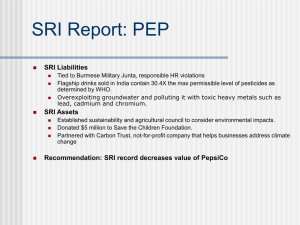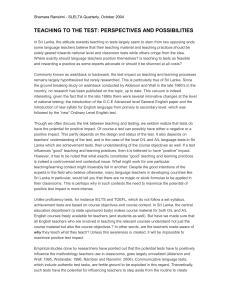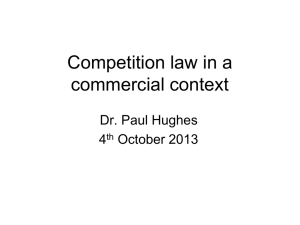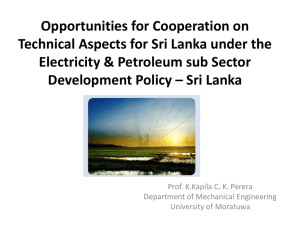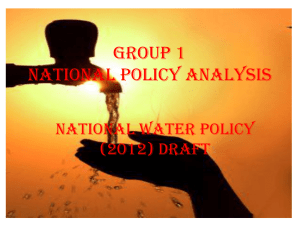United Nations Convention Against Torture and Other Cruel
advertisement
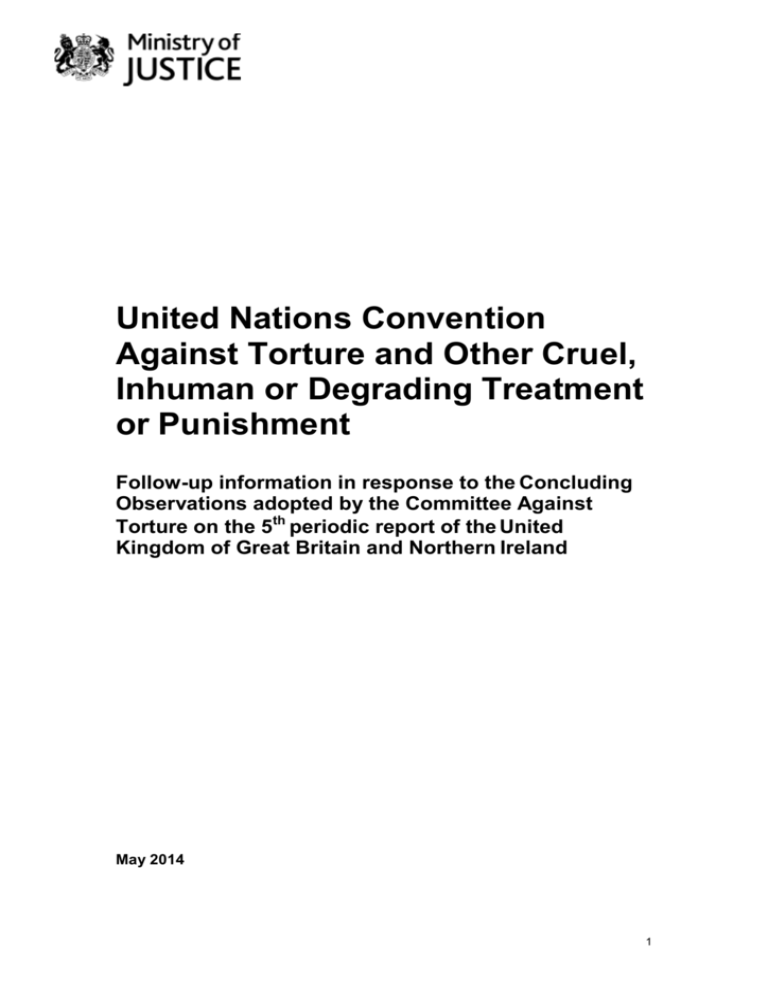
United Nations Convention Against Torture and Other Cruel, Inhuman or Degrading Treatment or Punishment Follow-up information in response to the Concluding Observations adopted by the Committee Against Torture on the 5th periodic report of the United Kingdom of Great Britain and Northern Ireland May 2014 1 2 1. The Committee Against Torture (the Committee) requested1 the UK Government to provide, by 31 May 2014, follow-up information in response to the Committee’s Concluding Observations relating to: (a) inquiries into allegations of torture overseas; (b) observance of safeguards ensuring respect for the principle of non-refoulement; (c) ensuring the prompt release and return to the United Kingdom of Shaker Aamer; (d) adopting comprehensive measures of transitional justice in Northern Ireland and (e) conducting prompt, thorough and independent investigations, as contained in paragraphs 15, 19, 20, 21, and 23 of the Committee’s Concluding Observations document2. 2. Having reviewed the Committee’s Concluding Observations, we consider that the Committee is seeking follow-up information by 31st May 2014 on the following areas:o Inquiries into allegations of torture overseas o Accountability for abuses in Iraq o Transfer of detainees to Afghanistan o Deportations to Sri Lanka o Release and return to the UK of Shaker Aamer o Transitional justice in Northern Ireland 3. We also note that the Committee has asked that the UK Government agree to follow the optional reporting procedure in preparing its 6th periodic report by 31st May 2017. Under this procedure, the Committee will send the UK Government a list of issues and the reply to those issues will constitute, under article 19 of the Convention, the UK Government’s next periodic report. The UK Government is content to agree to this request. 4. The response of the UK Government is set out below. Inquiries into allegations of torture overseas The Committee recommends that the State party establish without further delay an inquiry on alleged acts of torture and other ill-treatment of detainees held overseas committed by, at the instigation of or with the consent or acquiescence of British official. The State Party should ensure that the new inquiry is designed to satisfactorily address the shortcomings of the Detainee Inquiry, identified by a broad range of actors. In this regard, the Committee encourages the State party to give due consideration to the report of the Special Rapporteur on torture and other cruel, inhuman or degrading treatment or punishment (A/HRC/19/61). The State party should ensure that all perpetrators of torture and ill treatment identified in the context of the inquiry are duly prosecuted and punished appropriately, and that effective reparation, including adequate compensation, is granted to every victim. Furthermore, the Committee urges the State party to speedily publish the content of the interim report of the Detainee Inquiry to the fullest extent possible. (Paragraph 15 of the Concluding Observations) UK Government Response: 5. The UK Government published the Report of the Detainee Inquiry on Thursday 19 December 2013. The UK Government has asked the Intelligence and Security Committee (ISC) of the UK Parliament to inquire into the themes and issues identified in it, take further evidence and report to the UK Government and to Parliament on the outcome of their inquiry. It is hoped the ISC will be in a position to do so before the end of 2014, although the precise timetable is a matter for them. 1 2 Pages 13-14 of CAT/C/GBR/CO/5 CAT/C/GBR/CO/5 3 Accountability for abuses in Iraq The Committee urges the State party to take all necessary measures to establish responsibilities and ensure accountability, including setting up a single, independent public inquiry to investigate allegations of torture and cruel, inhuman or degrading treatment or punishment in Iraq from 2003 to 2009. In accordance with the Committee’s general comment No. 3 (2012) on implementation of article 14 by States parties, the State party should also ensure that all victims of torture, cruel, inhuman or degrading treatment obtain redress and are provided with an effective remedy and reparation, including restitution, fair and adequate financial compensation, satisfaction and appropriate medical care and rehabilitation. (Paragraph 16 of the Concluding Observations) UK Government Response: 6. The UK Government is committed to ensuring that appropriate measures are taken effectively and independently to investigate all allegations of wrongdoing made against members of the UK Armed Forces. It does not however accept that a single public inquiry must be set up to deal with allegations of the type set out in the Committee’s recommendation. 7. In the judgments in the case of R (Ali Zaki Mousa and others) v Secretary of State for Defence No 2, the High Court found that that the Secretary of State’s decision not to order a single public inquiry could not be impugned. The Court noted a number of factors which, in the present circumstances, would make it inappropriate to set up such an inquiry. These factors include the length of time it would take to complete a single public inquiry, the disproportionate costs involved, and the potential for revisiting matters that have already been addressed, including through the Baha Mousa Inquiry. 8. It is acknowledged that, although the Court found the Iraq Historic Allegations Team (IHAT) to be sufficiently independent, it also considered that where the State had an obligation to investigate under Article 2 ECHR (European Convention on Human Rights), the investigatory process as it was then constituted, was insufficient to discharge fully that obligation. Accordingly, it ordered that, in relation to a number of cases, an inquisitorial process modelled on coronial inquests should be established at the conclusion of the service police investigations. However, the Court considered that the procedure adopted by the IHAT, for the purpose of investigating alleged violations of Article 3 ECHR is “a more than proportionate performance” of the State’s duties, subject to making the inquiry accessible to the family and the public, and considering the issues of timeliness and delay. 9. Preparatory work on the first of these coronial-style fatality investigations began towards the end of 2013. A retired High Court judge was appointed in January 2014 as Inspector to supervise the first two cases. It is expected these two cases will be completed by autumn 2014. Transfer of detainees to Afghanistan The Committee recommends that the State party adopt a clear policy and ensure in practice that the transfer of detainees to another country is clearly prohibited when there are substantial grounds for believing that he or she would be in danger of being subjected to torture. It further recommends that the State party recognize that diplomatic assurances and monitoring arrangements cannot be relied upon to justify transfers when such substantial risk of torture exists. (Paragraph 19 of the Concluding Observations) UK Government Response: 10. As previously presented to the Committee, the UK already has a clear policy: it does not transfer detainees where, at the point of transfer, there is a real risk of serious mistreatment or torture. Accordingly the UK commenced transfers to the Afghan authorities at the Afghan National Detention Facility at Parwan in June 2013. This followed a thorough assessment of 4 the risk of mistreatment which was endorsed by the UK courts3. A variety of methods are required to judge and assure any given transfer route. Deportations to Sri Lanka The Committee recommends that the State party observes the safeguards to ensure respect for the principle of non-refoulement, including consideration of whether there are substantial grounds to indicate that an asylum-seeker might be in danger of torture or illtreatment upon deportation to his or her country of origin. The Committee calls on the State party to conduct a thorough risk assessment of situations covered by article 3 of the Convention, notably by taking into consideration evidence from Sri Lankans whose postremoval torture claim were found credible, and revise its country guidance accordingly. (Paragraph 20 of the Concluding Observations) UK Government Response: 11. The UK does not remove an individual where there are substantial grounds for believing that the individual will face a real risk of being tortured or subject to cruel, inhuman or degrading treatment. Where a situation covered by Article 3 of the Convention Against Torture arises, the UK rigorously applies the current country guidance case and objective country evidence in assessing whether or not there will be a risk to the individual on return. 12. The UK is prohibited from removing an individual to a place where that individual will face a real risk of being tortured, or similarly ill treated, by the terms of the Convention Against Torture and other international conventions which it has ratified, as well as our own domestic law. Allegations of mistreatment on return to any country are taken very seriously. 13. The policy on returns to Sri Lanka is informed by changes to the country situation and case law (both UK and European). It is reviewed on a continuous basis. Each application for the UK’s protection is case managed by trained officials. Every case is considered on its individual merits against up-to-date country information, relevant law and any handling guidance specific to the type of claim, such as on gender grounds. 14. Throughout 2012, the UK considered the allegations of mistreatment of returnees to Sri Lanka published in reports by Human Rights Watch, Freedom from Torture and Tamils Against Genocide. There were difficulties with these reports, as was recognised by the UK’s Immigration & Asylum Chamber, Upper Tribunal in the country guidance (CG) case of GJ and Others (post – civil war returnees) Sri Lanka CG [2013] UKUT 00319 (IAC) of 5 July 2013 (see attached appendix). 15. The UK’s policy position on the handling of applications from nationals from Sri Lanka is set out in an Operational Guidance Note (OGN) published in April 2012. The reports by Human Rights Watch, Freedom from Torture and Tamils Against Genocide were then fully addressed in a country policy bulletin published in October 2012. The UK reflected in this guidance an acceptance that torture does occur in Sri Lanka and that certain categories of individuals by fact of their profile, such as journalists or human rights activists, might be at risk, and also other individuals by an accumulation of risk factors. Thus, the policy reflected the country information and law, and ensured the UK complied with its international obligations. The reports did not provide evidence that Tamils per se were at risk and this was also reflected in the policy. 16. From February to April 2013 the Upper Tribunal of the UK Immigration and Asylum Chamber heard evidence in a new country guidance case for Sri Lanka. This case considered the position for Tamils returning to Sri Lanka, some 4 years since the defeat of the LTTE 3 The Queen (on application of) Niahmutullah Haqim (and 7 others) – and – Secretary of State for Defence, and the Queen (on the application of) Yahyah – and – Secretary of State for Defence 5 (Liberation Tigers of Tamil Eelam) in 2009, which was the last time the Tribunal had considered this issue. 17. A considerable amount of evidence was presented to the Tribunal, including from those organisations alleging the mistreatment of returnees. Again the UK Home Office considered this evidence and concluded that a change in policy was unwarranted pending the Tribunal reaching its conclusions. 18. During the hearing of the new country guidance case, the UK High Court issued an order in February 2013 which applied specifically to the enforced return of Tamil failed asylum seekers on one charter flight of 28 February 2013. This order was made because the decision in the CG case was expected shortly after April 2013 and the judge made no findings on safety on return (see appendix A). 19. The flight of 28 February 2013 to Sri Lanka went ahead and removed from the UK 13 individuals who had no rights to remain in the UK. There were no enforced returns of Tamil failed asylum seekers on that flight. The UK halted further enforced returns of Sri Lankan Tamil failed asylum seekers until the tribunal had promulgated its decision in the CG case. In the meantime, returns of other categories to Sri Lanka have continued since February 2013 and no allegations of mis-treatment have been received. 20. The Tribunal promulgated its decision in GJ and Others (post – civil war returnees) Sri Lanka CG [2013] UKUT 00319 (IAC) on 5 July and defined new risk categories for the handling of Sri Lankan applications for international protection (see appendix for details). They did not accept the submission that Tamils per se are at risk. 21. On 31 July 2013 the Home Office published a new OGN for Sri Lanka reflecting the Tribunal’s findings in the case of GJ & Others. An instruction was also issued to caseworkers that all current Sri Lankan cases must now be considered, before any removal decision, against the new risk categories identified by the Tribunal in GJ & Others. As the Tribunal considered all the reports the Committee is concerned with, this means we have updated our country guidance as recommended by the Committee. As stated above, consideration of case law is only one element of the UK’s consideration of a claim of international protection, and as such, the UK does not base its decisions solely on the findings of GJ & Others. 22. This has ensured that the UK fulfils its international obligations, including those under the Convention against Torture. Returns are only undertaken when the UK, including the UK courts, have judged it safe to do so. 23. Two of the appellants in the case of GJ & Others have now been granted permission to appeal to the Court of Appeal. Pending the Court of Appeal reaching its conclusions in the case, the Tribunal decision in GJ & Others remains country guidance law on returns to Sri Lanka. Each case however is considered on its individual merits and as stated above at paragraph 13, case law forms only part of the decision making process. Release and return to the UK of Shaker Aamer The Committee urges the State party to consider all possible measures to ensure the prompt release and return to the United Kingdom of Shaker Aamer, who has been detained without charges for over 11 years. In this context, the State party should follow up on its June 2012 and May 2013 requests to the Secretary of Defence of the United States of America to exercise a ‘waiver’, as contained within the National Defence Authorisation Act 2012, to enable to release of Shaker Aamer. (Paragraph 21 of the Concluding Observations) UK Government Response: 24. Mr Aamer’s case remains a high priority for the UK Government. Ministers and senior officials continue to raise Mr Aamer’s case with their US counterparts to make clear to the US that we 6 want him released and returned to the UK as a matter of urgency. The Prime Minister raised Mr Aamer’s case with President Obama during the G8 summit in Northern Ireland in June. The Prime Minister later wrote to President Obama reaffirming the importance the UK Government places on the request for Mr Aamer’s release. The Deputy Prime Minister went on to raise Mr Aamer’s case with Vice-President Biden in September 2013. The Foreign and Defence Secretaries also made representations to their US counterparts in 2013. The UK Government is confident that the US Government understands the seriousness of the UK’s request for Mr Aamer’s release. Notwithstanding this, any decision regarding Mr Aamer’s release ultimately remains in the hands of the US Government. Transitional justice in Northern Ireland The Committee recommends that the State party develop a comprehensive framework for transitional justice in Northern Ireland and ensure that prompt, thorough and independent investigations are conducted to establish the truth and identify, prosecute and punish perpetrators. In this context, the Committee is of the view that such a comprehensive approach, including the conduct of a public inquiry into the death of Patrick Finucane, would send a strong signal of its commitment to address past human rights violations impartially and transparently. The State party should also ensure that all victims of torture and ill-treatment are able to obtain adequate redress and reparation. (Paragraph 23 of the Concluding Observations) UK Government Response: 25. Northern Ireland, and the United Kingdom as a whole, has one of the most rigorous judicial systems in the world. The UK Government is committed to the full investigation of all deaths by lethal force that occurred during the ‘Troubles’ (the period from 1968 until the conclusion of the Belfast Agreement in 1998). There are a number of ways in which this will continue to be taken forward, including through inquests, investigations by the Office of the Police Ombudsman for Northern Ireland (OPONI) and the Historical Enquiries Team (the HET), independent reviews and, where appropriate, public inquiries. These mechanisms are themselves subject to rigorous inspection and review, by independent statutory bodies and by the courts through judicial review. In terms of reparations, there are some funds made available through the Northern Ireland Executive for victims and survivors of the Troubles. 26. Inquests into deaths, including those which involved, or are alleged to have involved, the security and law enforcement agencies, are conducted by a coroner. Inquests are an integral part of the system in place to ensure that deaths are properly investigated, in accordance with Article 2 ECHR. As a public authority, the Coroner is required by the Human Rights Act 1998 to ensure that any inquest is compliant with ECHR rights, taking into account judgments of the European Court of Human Rights. 27. The HET is an operational unit of the Police Service of Northern Ireland (PSNI), which was established in September 2005 to review all deaths relating to the Troubles. Between 2005 and 2010 it had an investigative capability and secured one conviction for murder. Since 2010, it has been a review body and now refers all evidential opportunities to Serious Crime Branch of the PSNI for investigation. That arrangement has secured two further murder convictions. As part of the PSNI, it is now the responsibility of the Northern Ireland Executive. The work of the HET is subject to rigorous inspection by Her Majesty’s Inspectorate of Constabulary (HMIC), which consists of independent inspectors appointed under the Police Act 1996. HMIC published a report on the HET in July 2013. Although largely critical, the report did note a number of positive aspects, including the HET’s positive impact in bringing some degree of resolution for the families who have engaged with the process, as well as the desire for it to be retained so long as improvements can be made to the way it works. The report contained 20 recommendations made by HMIC. The Chief Constable of the PSNI has accepted all of the recommendations and a working group has been established by the Northern Ireland Policing Board (NIPB) to ensure that they are all implemented. It is expected that this work will be completed within 2014. Work on reviews has been suspended until the 7 recommendations have been implemented. The Northern Ireland Justice Minister meets the NIPB monthly to be kept updated directly on the deliberations and progress of the Board’s Working Group, and the Northern Ireland Department of Justice have included this as a standing agenda item in the regular governance meetings with the NIPB. 28. The HET will continue to review all cases on a broadly chronological basis, whether or not there is family engagement with the case. Investigations by the HET will continue to be an important element of the framework for transitional justice. 29. OPONI was established under Part VII of the Police (Northern Ireland) Act 1998, which created a legislative framework for independent oversight of the police. It is tasked with investigating complaints by the public into the conduct of police officers, including any matters arising from HET investigations which raise concerns of possible police criminality. OPONI is itself subject to rigorous inspection by the Criminal Justice Inspectorate of Northern Ireland (CJINI), an independent statutory body. OPONI’s work on historic cases was temporarily suspended in September 2011 following a report by CJINI, but this suspension was lifted in January 2013 following a very positive follow-up review by CJINI. CJINI have said that they will re-consider the work of OPONI once three substantial historic reports have been completed. It is expected that this will take place later in 2014. 30. Decisions to hold public inquiries lie solely with the UK Government, through powers provided by the Inquiries Act 2005. The decision as to whether a public inquiry should be held will involve consideration of a number of factors, including the availability of other forms of prompt and effective investigation. In relation to the death of Patrick Finucane in February 1989, the UK Government considered very carefully whether or not to hold a public inquiry. The UK Government had already accepted that there was collusion in this case and the priority was to establish a full public account of what happened as quickly, effectively and transparently as possible. We believe the Patrick Finucane Review, conducted by Sir Desmond de Silva, achieved this. As Sir Desmond noted in his report, he was given access to all the evidence which he sought including highly sensitive intelligence files. The UK Government will continue to consider calls for inquiries on their individual merits, balancing the factors in favour of and against an inquiry, and taking into account the responsibilities of the State for the protection of national security and the protection of Convention rights. 31. The UK Government will continue to support the efforts of the devolved administration to address issues of transitional justice. In 2013, the Office of the First Minister and Deputy First Minister in Northern Ireland published the 'Together: Building a United Community' Strategy and established the All Party Working Group led by Dr. Richard Haass. All parties represented in the Northern Ireland Assembly participated in the talks, and groups and members of the public were invited to submit their views on how to address dealing with the past with a view to achieving a strategic solution. It did not prove possible for the Executive parties to reach full agreement but these talks have achieved much common ground that provides a platform for continuing discussions. The UK Government remains in close contact with all parties and is looking at how best to facilitate further progress to support their efforts. The UK Government is hopeful that these continuing discussions will result in further progress on issues relating to transitional justice. 8 Appendix A High Court decision of February 2013 Regarding the halt to Tamil failed asylum seeker returns in February 2013, the High Court judge stated: “I am far from persuaded that relief sought should cover everyone on this flight” [paragraph 21]. “In my judgment the situation which is presented to the court today is virtually unique. It arises from the very particular circumstances of the timing of the decision to remove these claimants by a charter flight, at the very same time that the UTIAC [Upper Tribunal Immigration & Asylum Chamber] is actively ----considering new country guidance” [paragraph 18]. Country Guidance case Findings by the UK’s Immigration and Asylum Chamber, Upper Tribunal in the new Sri Lankan country guidance case of GJ and Others (post – civil war returnees) Sri Lanka CG [2013] UKUT 00319 (IAC): 1. Anonymous and timing of allegations: - “it is unfortunate and unhelpful that ----- they [the organisations publishing the allegations] are unwilling to cooperate in enabling the respondent [the UK Government] to verify from her own database the examples on which they reply” (paragraph 278) “new evidence was produced close to the time of proposed charter flights” and were “particularly troubled that on at least two occasions reports were timed a day or two before a flight,” (paragraph 281). 2. Evidence: - They did not accept the submission [from Tamils Against Genocide] that all Tamils are at risk (paragraph 337) - “In his oral evidence Professor Rodley of Freedom from Torture accepted that even documented evidence of torture was not evidence of how, or where it had occurred” (71) - “Professor’s Rodley’s evidence did not allay our serious concerns about the reliability and research methods adopted in preparation of the composite FfT (Freedom from Torture) reports (243) - “The FfT evidence goes no further than establishing some returnees have been ill-treated, some of them with serious and permanent consequences” (245) - “In light of the extreme redaction of the FfT composite report information and absent any opportunity to examine the underlying medico legal reports, we are unable to give the same weight to the composite reports as normally given to FfT medico legal reports. We are not satisfied that the methodology used is sufficiently robust or the sample either representative or statistically significant ---“(246) - On commenting on the Human Rights Watch witness, “there is no means of assessing whether an adequate analysis of the underlying material was made”. (252) - For Tamils Against Genocide “ it was not her case that the sample group was representative or statistically significant” (255) Country Guidance conclusions: (para 356) 1) This determination replaces all existing country guidance on Sri Lanka. (2) The focus of the Sri Lankan Government’s concern has changed since the civil war ended in May 2009. The LTTE in Sri Lanka itself is a spent force and there have been no terrorist incidents since the end of the civil war. 9 (3) The Sri Lankan Government’s present objective is to identify Tamil activists in the diaspora who are working for Tamil separatism and to destabilise the unitary Sri Lankan state enshrined in Amendment 6(1) to the Sri Lankan Constitution in 1983, which prohibits the ‘violation of territorial integrity’ of Sri Lanka. Its focus is on preventing both (a) the resurgence of the LTTE or any similar Tamil separatist organisation and (b) the revival of the civil war within Sri Lanka. (4) If a person is detained by the Sri Lankan security services there remains a real risk of illtreatment or harm requiring international protection. (5) Internal relocation is not an option within Sri Lanka for a person at real risk from the Sri Lankan authorities, since the Government now controls the whole of Sri Lanka and Tamils are required to return to a named address after passing through the airport. (6) There are no detention facilities at the airport. Only those whose names appear on a “stop” list will be detained from the airport. Any risk for those in whom the Sri Lankan authorities are or become interested exists not at the airport, but after arrival in their home area, where their arrival will be verified by the CID or police within a few days. (7) The current categories of persons at real risk of persecution or serious harm on return to Sri Lanka, whether in detention or otherwise, are: (a) Individuals who are, or are perceived to be, a threat to the integrity of Sri Lanka as a single state because they are, or are perceived to have, a significant role in relation to post-conflict Tamil separatism within the diaspora and/or a renewal of hostilities within Sri Lanka. (b) Journalists (whether in print or other media) or human rights activists, who, in either case, have criticised the Sri Lankan Government, in particular its human rights record, or who are associated with publications critical of the Sri Lankan Government. (c) Individuals who have given evidence to the Lessons Learned and Reconciliation Commission implicating the Sri Lankan security forces, armed forces or the Sri Lankan authorities in alleged war crimes. Among those who may have witnessed war crimes during the conflict, particularly in the No-Fire Zones in May 2009, only those who have already identified themselves by giving such evidence would be known to the Sri Lankan authorities and therefore only they are at real risk of adverse attention or persecution on return as potential or actual war crimes witnesses. (d) A person whose name appears on a computerised “stop” list accessible at the airport, comprising a list of those against whom there is an extant court order or arrest warrant. Individuals whose name appears on a “stop” list will be stopped at the airport and handed over to the appropriate Sri Lankan authorities, in pursuance of such order or warrant. (8) The Sri Lankan authorities’ approach is based on sophisticated intelligence, both as to activities within Sri Lanka and in the diaspora. The Sri Lankan authorities know that many Sri Lankan Tamils travelled abroad as economic migrants and also that everyone in the Northern Province had some level of involvement with the LTTE during the civil war. In post-conflict Sri Lanka, an individual’s past history will be relevant only to the extent that it is perceived by the Sri Lankan authorities as indicating a present risk to the unitary Sri Lankan state or the Sri Lankan Government. (9) The Sri Lankan authorities maintain a computerised intelligence-led “watch” list. A person whose name appears on a “watch” list is not reasonably likely to be detained at the airport but will be monitored by the security services after his or her return. If that monitoring does not indicate that such a person is a Tamil activist working to destabilise the unitary Sri Lankan state or revive the internal armed conflict, the individual in question is not, in general, reasonably likely to be detained by the security forces. That will be a question of fact in each case, dependent on any diaspora activities carried out by such an individual. (10) Consideration must always be given to whether, in the light of an individual’s activities and responsibilities during the civil war, the exclusion clauses are engaged (Article 1F of the Refugee Convention and Article 12(2) of the Qualification Directive). Regard should be had to the categories for exclusion set out in the “Eligibility Guidelines For Assessing the International Protection Needs of Asylum-Seekers from Sri Lanka”, published by UNHCR on 21 December 2012. 10 © Crown copyright 2014 Produced by the Ministry of Justice You may re-use this information (excluding logos) free of charge in any format or medium, under the terms of the Open Government Licence. To view this licence, visit http://www.nationalarchives.gov.uk/doc/open-government-licence/ or email: psi@nationalarchives.gsi.gov.uk Where we have identified any third party copyright material you will need to obtain permission from the copyright holders concerned.
